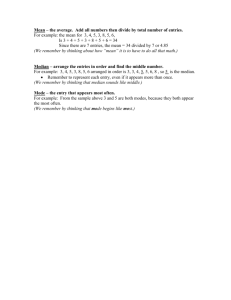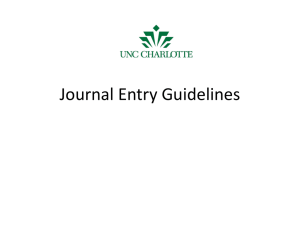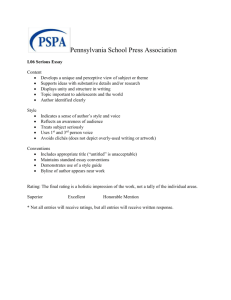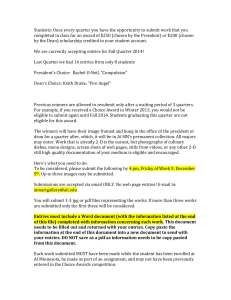To view the criteria for the awards, please click here
advertisement
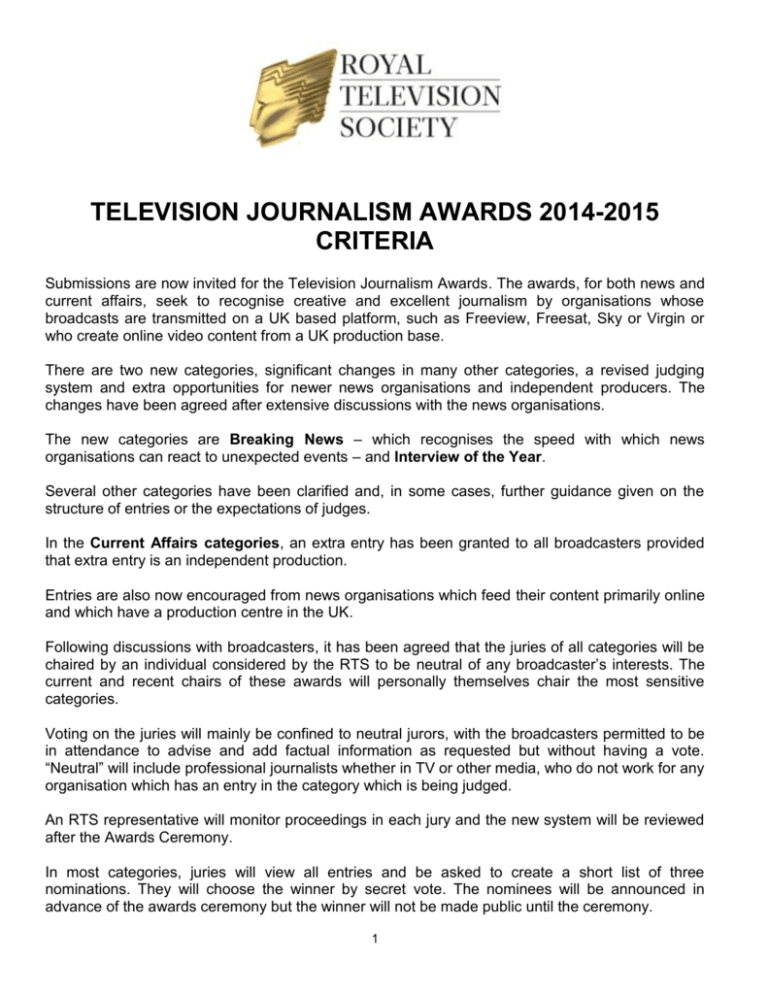
TELEVISION JOURNALISM AWARDS 2014-2015 CRITERIA Submissions are now invited for the Television Journalism Awards. The awards, for both news and current affairs, seek to recognise creative and excellent journalism by organisations whose broadcasts are transmitted on a UK based platform, such as Freeview, Freesat, Sky or Virgin or who create online video content from a UK production base. There are two new categories, significant changes in many other categories, a revised judging system and extra opportunities for newer news organisations and independent producers. The changes have been agreed after extensive discussions with the news organisations. The new categories are Breaking News – which recognises the speed with which news organisations can react to unexpected events – and Interview of the Year. Several other categories have been clarified and, in some cases, further guidance given on the structure of entries or the expectations of judges. In the Current Affairs categories, an extra entry has been granted to all broadcasters provided that extra entry is an independent production. Entries are also now encouraged from news organisations which feed their content primarily online and which have a production centre in the UK. Following discussions with broadcasters, it has been agreed that the juries of all categories will be chaired by an individual considered by the RTS to be neutral of any broadcaster’s interests. The current and recent chairs of these awards will personally themselves chair the most sensitive categories. Voting on the juries will mainly be confined to neutral jurors, with the broadcasters permitted to be in attendance to advise and add factual information as requested but without having a vote. “Neutral” will include professional journalists whether in TV or other media, who do not work for any organisation which has an entry in the category which is being judged. An RTS representative will monitor proceedings in each jury and the new system will be reviewed after the Awards Ceremony. In most categories, juries will view all entries and be asked to create a short list of three nominations. They will choose the winner by secret vote. The nominees will be announced in advance of the awards ceremony but the winner will not be made public until the ceremony. 1 The Awards Ceremony will be held on Wednesday 17 February 2016 at the London Hilton, Park Lane, London W1K 1BE. If there are questions on the eligibility of any entry, these should be addressed to Jo Sampson at jo@rts.org.uk. 2 NEWS AWARDS News Coverage – Home The Home News Award is for the best coverage of a major news story in the UK. The award is intended to recognise every aspect of coverage including journalistic enterprise, quality of reporting, picture content, analysis and explanation, and comprehensiveness of overall coverage, including speed of reaction in unexpected or unplanned stories (although a separate award, Breaking News, concentrates specifically on this aspect). Entries: Up to three entries per channel to a maximum of 20 minutes per entry. In addition, news teams serving a nation (Scotland, Wales or Northern Ireland) or a region of one of those nations or an English region or sub-region or the Channel Islands may submit two stories which have appeared on a UK-wide channel. Entries can consist of a maximum of 10 excerpts, each clearly identified by time and date. Sequences must be separated briefly by black and must not be edited internally. Entries from news agencies should include copies of scripts sent with the original material and, where possible, details of how the content was used by broadcasters. News Coverage - International The International News Award is for the best coverage of a major news story outside the UK. The award is intended to recognise every aspect of coverage including journalistic enterprise, quality of reporting and picture content, analysis and explanation and comprehensiveness of overall coverage, including speed of reaction in unexpected or unplanned stories (although a separate award, Breaking News, concentrates specifically on this aspect).. Entries: Up to three entries per channel or agency to a maximum of 20 minutes per entry. In addition, news teams serving a nation (Scotland, Wales or Northern Ireland) or a region of one of those nations or an English region or sub-region or the Channel Islands may submit two stories which have appeared on a UK-wide channel. Entries can consist of a maximum of 10 excerpts, each clearly identified by time and date. Sequences must be separated briefly by black and must not be edited internally. Entries from news agencies should include copies of scripts sent with the original material and, where possible, details of how the content was used by broadcasters. Daily News Programme of the Year The News Programme of the Year Award is for the programme which has consistently demonstrated journalistic excellence throughout the year, reflecting the personality and breadth of the programme. Entries: Up to three entries per channel or agency to a maximum of 60 minutes per entry. In addition, news teams serving a nation (Scotland, Wales or Northern Ireland) or a region of one of those nations or an English region or sub-region or the Channel Islands may submit a single entry. Entries can consist of up to a maximum of 30 separate sequences, each clearly identified by time and date. Sequences must be separated briefly by black and must not be edited internally. 3 News Channel of the Year The News Channel of the Year Award is for the news channel which has best reported the events of the year to viewers in the UK. The jury may take into account the performance of a channel beyond the submitted material. Entries: One per channel. Each entry should consist of a maximum of 40 excerpts and should be separately identifiable extracts, with no internal edits, of up to 60 minutes in total covering a number of different news events. The material must be as first broadcast. Submissions should indicate the date and time of each extract. Breaking News (NEW CATEGORY) This award recognises the expertise of news organisations in proving their "fast footwork" on a key story. The judges will be looking for the alertness with which a news organisation assesses the value and significance of an unexpected or unscheduled story; the speed with which it brings cogent reports to the viewer; and the evidence of swiftly organising resources to establish continued coverage. It is expected that judges will want evidence of how much is achieved within the first eight hours of a news event. Entries: Up to two entries per channel to a maximum of 30 minutes per entry. Entries can consist of a maximum of 10 excerpts, each clearly identified by time and date. Sequences must be separated briefly by black and must not be edited internally. Entries from news agencies should include copies of scripts sent with the original material and, where possible, details of how the content was used by broadcasters. News Technology This award recognises the way in which news organisations harness technology in an innovative way to support and enhance journalism and the delivery of news. This could range from graphical displays to content ingest, from deploying new devices in the field to finding new ways to engage viewers. It is likely that entrants will need to support their entry with information to help the judges understand why the innovation deserves special credit: this can be done on video with commentary or with text. Entries: Up to two per news organisation, agency or production company. Entries may be single pieces of media or separately identifiable extracts with no internal edits. CURRENT AFFAIRS AWARDS Current Affairs - Home The Home Current Affairs Award is for the best piece of current affairs journalism shot in the UK. It seeks to recognise excellence in programmes ranging from daily long-form news to weekly or biweekly current affairs and to other forms of topical television journalism. Short-form single current affairs items are also eligible for entry. However, documentaries should be entered in the documentary categories in the RTS Programme Awards. Entries: Normally three entries per channel but up to four per channel if one is an independent production. Entries should be a single programme or a single report from a programme, but not multi-item programmes or compilations. Entries must not be edited or repackaged. 4 Current Affairs - International The International Current Affairs Award is for the best piece of non UK current affairs journalism. The programme should be substantially about an international subject. It seeks to recognise excellence in programmes ranging from daily long-form news to weekly or bi-weekly current affairs and to other forms of topical journalism. Short form single current affairs items are also eligible for entry. However, documentaries should be entered in the documentary categories in the RTS Programme Awards. Entries: Normally three entries per channel or agency but up to four per channel if one is an independent production. Entries should be a single programme or a single report from a programme, but not multi-item programmes or compilations. Entries must not be edited or repackaged. NATIONS AND REGIONS AWARDS Nations and Regions News The Nations and Regions News Award is for the best coverage either of a single major news story or of a series of stories over the course of the year. Entries are invited from news teams in the nations (Scotland, Wales or Northern Ireland), the regions of those nations, the English regions and sub-regions, the Channel Islands and local TV services in the UK. Entries: One per news team, up to 30 minutes in length. Entries can consist of a maximum of eight separate sequences from the coverage of a major news story over a period of 24 hours each clearly identified by time and date or a maximum of eight separate sequences from different news stories over the course of a year, similarly clearly identified. In all entries, sequences should be separated by black spacing and must not be edited internally. Nations and Regions Current Affairs This Award is for the best piece of current affairs journalism commissioned, made and first transmitted in a region. Entries are invited from teams in the nations (Scotland, Wales and Northern Ireland), the regions of those nations, the English regions and sub-regions, the Channel Islands and local TV services in the UK. Entries: Normally one per region but two if one is an independent production, of any length up to 60 minutes. Entries should be a single programme or a single report from a programme. Regional Presenter of the Year The Regional Presenter of the Year Award is for the best regional news or current affairs presenter. The entries should demonstrate the range of the presenter, potentially including interviews, response to breaking news, and location presentation as well as programme presentation. The jury may take into account the performance of a presenter beyond the submitted material. Entries: One per region of up to 30 minutes with a maximum of 10 excerpts. Entries may be single items or separately identifiable extracts, with no internal edits. Entrants are permitted to include material from more than one channel in their entry but must only be their work from news or current affairs. Where there is a crossover of channels, entrants will need to specify from which channel their entry comes.) 5 OTHER AWARDS Scoop of the Year This award recognises exclusive, original journalism in either news or current affairs by a broadcaster or agency. Entries will be judged on the strength of the journalism and the wider impact more than the production values of the transmitted story. Entries: Up to three entries per channel of up to 30 minutes each, consisting of a maximum of 10 excerpts. Entries may either be single items or separately identifiable extracts, with no internal edits, of items taken from the coverage of one story. Specialist Journalist of the Year The award recognises specialist reporting of thematic genres such as arts, entertainment, science, health, education, business, economics, politics and defence. It is not the intention to invite entries of portfolios of non-specialist coverage from journalists with geographical assignments such as ‘Middle East correspondent’ or North of England reporter’. However a journalist with such a title could submit a portfolio of specialist stories in a single genre. For example an Africa correspondent could submit a portfolio of stories about health in Africa or a Washington Correspondent might send in an entry about coverage of US politics. The jury may take into account the performance of the individual beyond the submitted material. Entries: Two per channel of up to 30 minutes. Entries must be separately identifiable extracts, with no internal edits. Young Talent of the Year The Young Talent of the Year Award is for the best work during the year by an on- or off-screen journalist, editor, video journalist, camera operator or technician involved in the production of broadcast news. Entrants must be under the age of 30 (on the last day of the twelve month period from which entries are invited). Judges will look for evidence of a range of ability. In the case of off-screen candidates especially (but all candidates ideally), the judges will welcome supporting material and background information to help understand the individual contribution. Entries: Two per channel or news organisations, agency or production company of up to 30 minutes. Entries should consist of a maximum of five excerpts with no internal edits, to demonstrate range. Television Journalist of the Year The Television Journalist of the Year award is for the best work during the year by an on-screen television journalist. Judges will expect to see a demonstration of the range of the journalist and may take into account the performance of a journalist beyond the submitted material. Entries: Up to three per channel of up to 30 minutes. Entries, with no internal edits, should include a minimum of three items to demonstrate range. 6 Camera Operator of the Year The Camera Operator of the Year Award is for the best work by a camera operator in news or current affairs. The judges will wish to see the breadth and depth of the camera operator’s skill. It will be particularly helpful for the jury to be provided with background information on whether, for example, the camera operator also helped to produce the items or edited them. Entries: Up to three per channel or agency of up to 15 minutes. The submitted material should consist of pictures and effects only, ie without any added commentary, although a written script may be submitted as well. Only in exceptional circumstances will an entry with commentary be considered. The material should be as first broadcast (or, in the case of agencies, as sent to clients on the day) with no subsequent edits. Natural sound levels may be restored to their original levels as recorded at the time but no enhancement. Network Presenter of the Year The Network Presenter of the Year Award is for the best news or current affairs presenter whose skills may include interviewing, responding to breaking news and presenting on location as well as studio presentation. Reporter packages made on presentation assignments may be submitted but this category is primarily for presenting not reporting and those reports can be submitted into the news coverage categories. The jury may take into account the performance of a presenter beyond the submitted material. Entries: Up to five entries per organisation of up to 30 minutes. Please provide a maximum of 10 excerpts. Entries may be single items or separately identifiable extracts, with no internal edits. Entrants are permitted to include material from more than one channel in their entry but must only be from their work for news or current affairs. Where there is a crossover of channels, entrants will need to specify from which channel their entry comes.) The Independent Award This award is to recognise the best original video journalism by an independent production company. Emphasis will be placed on material or stories that would not have been seen without the individual contribution of the entrant. The material must have been shown in video form on either a television channel or website. Entries: Two entries per independent production company. Entries should be a single piece of work, a complete item and not an excerpt and be news or current affairs based. The maximum length of each entry is 30 minutes. Interview of the Year (new category) This award recognises the importance of the interview in creating news and in analysing news. The judges will be looking for an interview which reveals new - and often unexpected - information and understanding and for the demonstration of journalistic skills and personal persistence of the interviewer. The award is given for the best interview, not for the best package of interviews by one journalist. Entries: Up to three entries per news organisation with a maximum of 20 minutes per entry. No editing is permitted within the entry. 7 AWARD CHOSEN BY CHAIRS OF JURIES, BROADCASTER REPRESENTATIVES, NEWS ORGANISATIONS AND NEWS PROVIDERS/ AGENCIES The following award will be awarded or deferred at the discretion of the panel: Judges’ Award The Judges’ Award can be presented to an individual (on- or off screen) or a production team to recognise an outstanding contribution to the advancement of Television Journalism either specifically in the past year or in the case of an individual, over the course of their career. At its discretion, the panel can use the Award to recognise other outstanding achievements which do not fit neatly in to any other category. This Award is in the gift of the panel and entries are not requested; however, suggestions are welcome. This Award cannot be awarded posthumously. 8 TELEVISION JOURNALISM AWARDS 2014-2015 CONDITIONS OF ENTRY 1 Entries will be accepted from broadcasting organisations, news providers, freelance technicians and independent producers whose broadcasts are transmitted on a UK based platform, such as Freeview, Freesat, Sky or Virgin or who create online video content from a UK production base. 2 All entries must have been first transmitted on any platform in the UK or made available through a website between 16 November 2014 and 15 November 2015. 3 Entries should be checked carefully to ensure that they meet the criteria and conditions of entry and that sound and vision are continuous throughout. If entries are found not to meet criteria and conditions of entry they may be declared ineligible at any stage in the judging process. 4 Entries must be endorsed by the television organisation or agency which transmitted or distributed the material. 5 The entry must be as originally edited for transmission. Except where indicated otherwise, no items may have internal edits and individual excerpts must be clearly identified. Subsequent editing to improve the recording for the purpose of these Awards is not permitted. 6 Sound tracks on news items should contain only the sound recorded at the time of shooting unless otherwise stated in the criteria. 7 All entries must be submitted using the RTS Online Awards Entry System https://awardsentry.rts.org.uk/entrant/index.php. Please contact Jamie O’Neill on 020 7822 2821 or jamie@rts.org.uk with any queries about the system. 8 Please be aware that should your entry receive a nomination (nominations will be announced at the end of January), your 30 second nomination clips will be projected on the large screen at the ceremony in HD – to avoid your nomination looking substandard on the screen compared to other entries, we would encourage you to adhere to the following delivery requirements: the ideal delivery format for nomination clips is DNXHD (both 120 and 185 are acceptable), supplied on an SSD hard drive, with all sound a stereo final mix. Alternatively, nomination clips can be accepted on HD Cam or via email. 9 Where necessary, entries should be accompanied by background information to assist the judges. All supplementary information must be submitted at the time of entry. 10 The cost per entry is £285.00 + £57.00 VAT. 11 Programmes submitted for the RTS Journalism Awards Home and International Current Affairs categories are also eligible for submission to the RTS Programme Awards ONLY if the programme clearly demonstrates both disciplines. 13 The closing date for entries is Friday 4 December (this deadline cannot be extended) 14 The decisions made by the judges are final and no correspondence can be entered into as to why particular entries were not chosen for nomination. 15 The RTS will require permission to rebroadcast on its website any clips of nominated entries shown at the ceremony. 16 PLEASE ENSURE THAT ALL ENTRIES ARE DOUBLE-CHECKED TO ENSURE COMPLIANCE WITH THE CONDITIONS OF ENTRY. 9
